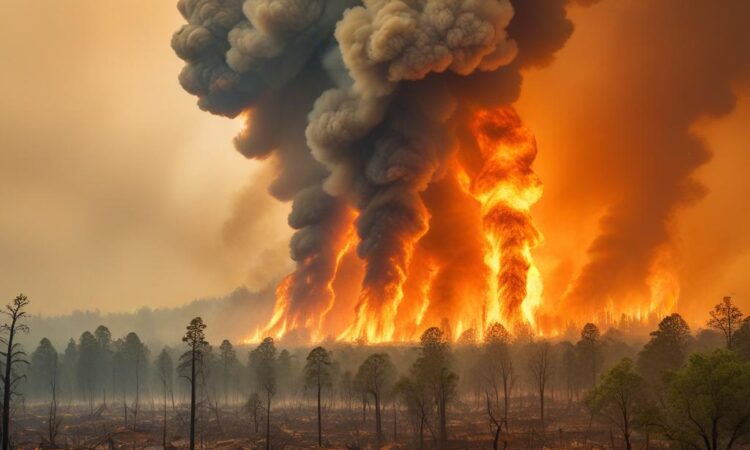Climate Change Impacts and Mitigation: A Global Call to Action
The Earth is experiencing a dramatic shift in its climate, with far-reaching consequences for societies and ecosystems worldwide. Recent events, such as devastating wildfires in Canada and unprecedented heat waves across Europe, serve as stark reminders of the urgency of addressing climate change and its impacts. This escalating crisis demands immediate action to mitigate its effects and build resilience for a sustainable future.
The Urgency of Climate Change
Climate change is no longer a distant threat but a present reality. The Intergovernmental Panel on Climate Change (IPCC), the leading international body for the assessment of climate change, has concluded that human activities are the dominant cause of observed warming since the mid-20th century. The evidence is clear: global temperatures are rising, sea levels are increasing, and extreme weather events are becoming more frequent and intense. These changes are already having profound impacts on communities, economies, and natural ecosystems.
Extreme Weather Events: A Growing Threat
Extreme weather events, such as heatwaves, droughts, floods, and wildfires, are becoming increasingly common and severe due to climate change. These events pose significant threats to human health, infrastructure, and biodiversity. The recent wildfires in Canada, fueled by prolonged drought and high temperatures, have released unprecedented amounts of greenhouse gases into the atmosphere, contributing to further warming. Similarly, the heat waves across Europe have led to widespread health problems, crop failures, and energy shortages.
Canadian Wildfires: A Devastating Example
The wildfires in Canada during the summer of 2023 were a devastating example of the escalating impacts of climate change. These fires have burned millions of acres of forest, displaced thousands of people, and released record amounts of smoke and pollutants into the atmosphere. The smoke plumes have traveled across vast distances, impacting air quality and human health in North America and beyond.
European Heat Waves: A Sign of Things to Come
The heat waves that have gripped Europe in recent years have also been unprecedented in their intensity and duration. These extreme temperatures have led to widespread health problems, including heatstroke and dehydration, and have strained energy grids and infrastructure. The heat waves have also had a significant impact on agriculture, leading to crop failures and reduced yields.
The Human Cost of Climate Change
The impacts of climate change are not limited to environmental damage. They are also having a profound impact on human societies, leading to displacement, poverty, and conflict. The increasing frequency and intensity of extreme weather events are displacing communities, disrupting livelihoods, and exacerbating existing inequalities. The World Bank estimates that climate change could push up to 143 million people into poverty by 2030.
Mitigation Strategies: Reducing Greenhouse Gas Emissions
Addressing climate change requires a global effort to reduce greenhouse gas emissions and transition to a more sustainable future. Mitigation strategies focus on reducing the rate of climate change by limiting the amount of greenhouse gases released into the atmosphere. These strategies include:
1. Transitioning to Renewable Energy
Renewable energy sources, such as solar, wind, and hydropower, are essential for reducing reliance on fossil fuels. Investing in renewable energy infrastructure and technology will help to decarbonize the energy sector and reduce greenhouse gas emissions.
2. Improving Energy Efficiency
Reducing energy consumption through improved efficiency is a critical aspect of climate change mitigation. This can be achieved by adopting energy-efficient buildings, appliances, and transportation systems.
3. Reducing Deforestation and Promoting Reforestation
Forests play a vital role in absorbing carbon dioxide from the atmosphere. Reducing deforestation and promoting reforestation are essential for mitigating climate change. Sustainable forestry practices can help to conserve existing forests and promote the growth of new trees.
4. Investing in Sustainable Agriculture
The agricultural sector is a major contributor to greenhouse gas emissions. Sustainable agriculture practices, such as reducing fertilizer use, improving soil health, and promoting organic farming, can significantly reduce these emissions.
Adaptation Strategies: Building Resilience
While mitigation strategies aim to reduce the rate of climate change, adaptation strategies focus on building resilience to the impacts that are already occurring. These strategies include:
1. Developing Early Warning Systems
Early warning systems can help communities prepare for and respond to extreme weather events. These systems can provide timely information on approaching storms, heat waves, or other hazards, allowing people to take necessary precautions.
2. Protecting Infrastructure
Climate change is increasing the risk of damage to infrastructure, such as roads, bridges, and power grids. Investing in climate-resilient infrastructure can help to protect communities from the impacts of extreme weather events.
3. Enhancing Water Management
Climate change is impacting water resources worldwide, leading to increased droughts and floods. Effective water management practices, such as improving water storage and distribution systems, are crucial for adapting to these changes.
4. Promoting Sustainable Coastal Management
Rising sea levels pose a significant threat to coastal communities. Sustainable coastal management practices, such as restoring coastal ecosystems and implementing seawalls, can help to protect these communities from erosion and flooding.
Global Cooperation: A Shared Responsibility
Addressing climate change is a global challenge that requires international cooperation and collaboration. All countries must work together to reduce emissions, build resilience, and support vulnerable communities. The Paris Agreement, adopted in 2015, is a landmark agreement that provides a framework for global climate action. However, much more needs to be done to implement its ambitious goals.
Conclusion: A Call to Action
The impacts of climate change are already being felt around the world, with extreme weather events becoming increasingly common and severe. Addressing this crisis requires immediate action to mitigate its effects and build resilience for a sustainable future. We must transition to a low-carbon economy, invest in renewable energy, and adopt sustainable practices across all sectors. Global cooperation is essential to effectively address this shared challenge. The time for action is now. Let’s work together to protect our planet and ensure a healthy and prosperous future for generations to come.

